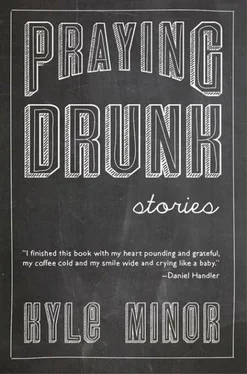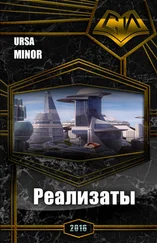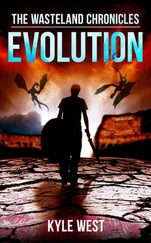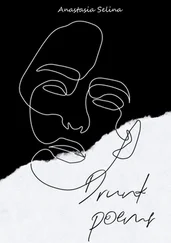When I got back from the mango trees and the graves and overseeing the dreary work of cleanup and the business of reuniting monkey with master, I marched into Larry Garvey’s office and said, “Where is she?” He just shrugged his shoulders and pointed vaguely in all directions. I met T. C. Johnson out in the co-op fields, and I said, “Where is she?” He turned his palms toward the sky and said, “Last time I saw her, she was headed toward the village.” I walked out into the village by myself and I asked all the women, and they would speak with me of everything but the girl. I walked all the way to the next town. No one would talk there, either. It was getting dark by then, and if I had any regard for my own life I wouldn’t have been out walking those mountain paths by myself, anyway, but, Ervin, this country has made me a tough old broad, and I like to think I could hold my own with any two machete-wielding teenagers. Somewhere between the Pentecostal church and the old French fort, a woman with whom I had spoken earlier in the day, name of Jilene, stepped out of her house and took my arm and walked with me for a while. At first I thought she meant to be protective of me, but then she said, “You are looking for Madame Samuel?” and I said I was, and she pointed toward a house a few hundred feet away and said, “Do not bring her any more sadness.” Then she kissed me on both cheeks and we parted.
The house was made of stone and mortar, with a roof of corrugated tin with holes rusted through at irregular intervals. Here and there, the holes had been patched by laying a square of tin or aluminum on top and anchoring it with a large loose rock. Probably underneath the rock, inside the house, was a floor full of pots and basins strategically arranged to catch the rainwater. I’ve seen it plenty before. The outside of the house had been long ago painted a thick green, but time had washed the color thin at the mortar, and thinner where the stones protruded. Mortar and stone alike were dirtwashed and claywashed. Here and there the gray and orange overtook the green, so there was a shag carpet effect when you saw the place from a distance. An old dirty shag carpet from the floor of somebody’s doghouse, let’s say. I could only imagine what it was like on the inside.
Nobody answered when I knocked, but I could hear whispering inside, and soft clattering. I knocked again, and it got quieter. I knocked a third time, and the door opened a crack. I saw a white eyeball in a black socket. A man spoke to me in a broken-down English that sounded like Kreyol: “What do you want?”
The girl, I said. Is she here? Will she come talk with me? I came from Okap to see her. People are worried about her. Can I come inside?
“Wait,” the man said. He closed the door. More whispering inside. Perhaps some arguing. The door opened again, and the man came outside. He was tall, for a Haitian, and handsome. “There is no one here,” he said.
“But there is,” I said. “I heard the voices inside.”
“That is my family,” he said. “My brother, my sisters.”
“Are you a Christian?” I said.
He allowed that he was.
“Do you mean your brother and sisters from your father and mother, or do you mean your brother and sisters in Christ?”
He looked around, up and down the street. People were watching. He said, “This is not your country.”
I switched to Kreyol. “For many years it has been my country,” I said.
“Look at your skin,” he said. “You are a blan . This is a country of nèg yo .”
“You are a Christian,” I said. “Do you know the Scripture, the words of Bondye spoken through the Apostle Paul? In Christ there is neither Jew nor Gentile, neither slave nor free, neither male nor female.”
“And yet,” he said, “the missionaries have everything and we have nothing. Look at me. Look at where I live. I live very well, but next to the mission, I have nothing.”
“Is that what you desire for her, then?” I said. “To have nothing, like you say you have nothing? She is missing, and she is far from home. Her husband has died. Her mother, her father are worried about her.”
He scratched at a scab near his temple. “Her husband was a brother to me,” he said. “He baptized all my children. He paid for medicine for my mother. He told me if I died, he would take care of my family.”
“What is your name?” I said.
“They know my name at the mission,” he said. Already he was going inside. Already he was closing the door.
I put my foot between the door and the doorpost. He drew himself to full height. I said, “Sheila, honey, are you in there?”
“Please,” he said. “Do not put your foot in the door.”
I called out: “Sheila? Are you in there? My name is Linda Reelitz. I have letters from your mother and your father. I have documents from Brother Sam. There is property that is yours in Florida? Did you know? There are people who love you, Sheila, and they are worried about you.”
Nobody made a noise inside. The man put his foot against mine. He did not kick or push at my foot. He said, “Please, now you will go away.”
What else could I do? “Sheila,” I called. “I will be back tomorrow. Let’s talk tomorrow morning, okay?”
I took my foot away from the doorpost. He looked at me for a moment. What I read on him was mostly relief. He closed the door softly. I walked back to the mission in the darkness, alone.
A late-night staff meeting was hastily convened. I described the shag carpet house, and Brothers T. C. and Larry right away exchanged one of those Didn’t we know it? looks, and in unison, like some quarter-throated choir, everyone in the room said Kenel , by which, I learned, they meant Kenel Depitor, a co-op farmer who had been close with Brother Sam. I asked the questions you’d expect: What’s going on here? How long’s she run off? Why this Kenel Depitor? What’s the relationship here? Is this a mere friendship, or might she have waded into something sexual?
Nobody seemed to know what to say, right off. Faces drew tight. Shoulders were shrugged. Glances, seemingly meaningful, were exchanged, but not with me. Eye contact of that sort was rare as a seven-dollar bill. Things were said that didn’t mean anything: It’s hard to know, it’s complicated, Sheila’s a tough nut to crack, Sam could be a weird egg.
“Listen,” I said. “You people have been through a lot. Lord knows. You’ve lost a lot of people you love. Good people. In a short time. And here’s your last link to one of them, this girl who got dropped on you even though you probably didn’t want her, but here she is, and she was Sam’s, and you loved Sam, and Sam is gone, and she’s all you’ve got left of Sam. So you’ve got your loyalty to Sam, and you don’t want to hurt this girl, and neither do I. Neither does anybody. But there’s stuff going on here that doesn’t smell right. I’ve seen it all, and now I’ve got the spiritual gift of seeing through it all. I watched my Ed’s head crushed between the cab and the bed of an old pickup truck, and I watched my housekeeper fall off the side of a cliff with her house back when we still lived in the mountains. I don’t know what to do with any of it. All I know is there’s this girl, and one way or another she’s in over her head, and we’ve got to get her home so she can make some kind of life for herself and not have everybody just thinking of her as the widow at the ripe old age of fourteen or whatever she is.”
I went on like that for a while, just provoking. It didn’t hurt me one bit to do it. I just beat on them like that. When an English word wouldn’t do, I used a French word, and when French wasn’t crude enough, I hammered them with Kreyol. I played the tired old widow and I played Ervin’s monster come down from the north to chew and spit. Finally, Sisters Patty and Thelma started talking a little. Yes, they said, Sam was a weird egg. Yes, Sheila was a tough nut to crack. It’s not that they knew things and were choosing to withhold them from me, their interrogator. They didn’t know, and it’s what they didn’t know that wore them at the edges. What they had to offer was gossip, idle talk, conjecture, theories half-formed. What they had was nothing edifying. What they had wasn’t much. That’s why the hemming and that’s why the hawing.
Читать дальше












